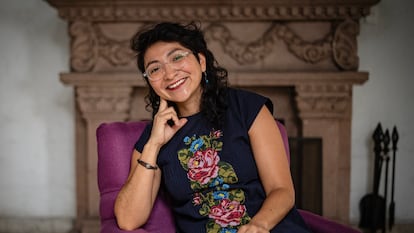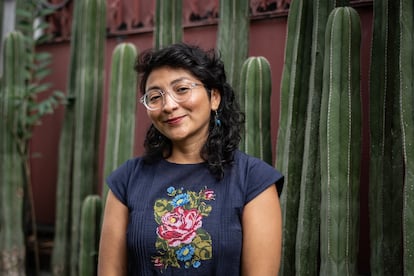Fátima Gamboa: ‘I am Mayan, lesbian and feminist’
The director of Equis Justice for Women helps women get access to justice in Mexico regardless of their origin and resources


Fátima Gamboa is director of the organization Equis Justice for Women and her work as a human rights lawyer has made her a point of reference in Mexico. Originally from the state of Yucatan, she has witnessed firsthand the difficulty many women have in accessing justice and of living a life devoid of violence. Language barriers, sexism and social and economic inequality have turned Mexican courts into a luxury only a few can afford. At 38, Gamboa says she is convinced that another form of justice is possible in the country: a new, open and accessible system available to everyone regardless of their origin and resources.
Every day in Mexico between 10 and 11 women are murdered and approximately 60 are raped. Of the total violent deaths, only 30% will be investigated as femicides, the rest will become part of a crime figure that has soared in the last 30 years and that shows how the widespread violence in the country also affects women.
Aside from this stark reality, Gamboa points out that the justice system works against the interests of the poorest indigenous women, with many convictions still made as a result of sexist attitudes and racial prejudice. “Many women who have murdered their husbands in self-defense are now in prison,” she says. “The fact these women come from a violent environment and are in a vulnerable situation is not taken into account. Nor is the economic context. That is why it is important to investigate and judge from a gender perspective. We live in a system that does not believe what women say, preferring to trust the word of their accuser instead, which is why we want judges to start looking at women from a position of freedom and autonomy.”

It is a warm November morning in Mexico City and Gamboa talks about her work and her reasons for going into law. Next to her is her dog, Tatich, which means old or wise in Mayan. “I am a Mayan woman, a lesbian and a feminist; I have politicized this and now use it with other women to heal together,” she explains. “I think subconsciously I became an advocate for healing because all through my childhood I was faced with sexist and racist systems that were constantly telling me there was something wrong with me; that I was backward for having attention deficit disorder (ADHD) and a tomboy for playing soccer and not concentrating on beauty.”
Years later, Gamboa discovered that she needed the law to defend herself, but soon realized it was not enough for laws to exist. Access to justice was unequal and women were at a disadvantage. “The law sees to it that women remain unequal, placing their bodies at the service of men, allowing for rape and punishing self-defense thereby taking away their right to defend themselves,” she says. Gamboa says that this is when she discovered feminism which deeply influenced how she practiced her profession. “I read feminist authors who question the law and found that feminism could be a means of social transformation for women. But, above all, I found a way to help them and be useful to my community.”
Gamboa argues that it is important to approach the law from a feminist perspective because “it serves to question the systems of oppression that affect us.” She adds: “Feminism is a way to understand part of the problem, but it is also necessary to incorporate the racial and indigenous struggle so that feminism can be transformative. I come from a Mayan family in which my grandmother was exchanged for merchandise and more or less lived the life of a kidnappee with the chief of the community.”
Her grandmother and her family had to flee from the Kimbilá community to the city of Mérida and start over. The experience marked them forever. Gamboa says that when a woman is subjected to patriarchal or colonialist violence and is forcefully displaced, she loses something of herself. “She loses her body and her spirit,” she says.
Gamboa believes that plurality in feminism is vital, especially in a country as diverse as Mexico. “At Equis Justice for Women we have a motto: ‘Our feminism lies in the justice of others.’ Because in the search for justice, we are all equal and no one is above anyone else. It means we address the experience and the value of others from a horizontal perspective. When it comes to justice, it’s a circle. Who am I to say to someone they are not in it? We must listen to the voices of all women. Of indigenous women, of those who have been deprived of their freedom, of trans women, and also of women with disabilities.”
Gamboa says her organization is working to change women’s lives both without and within. “We apply care policies that allow us to address the work/life balance, and that means understanding that we are not a factory and there is nothing labor-related that should undermine our human condition.”
While Gamboa’s grandmother left the Kimbilá community to survive, Gamboa herself has returned and proudly wears the traditional dress. “My body was able to go back to its roots and then I was also able to embrace my lesbianism,” she says. “I recovered desire and was able to remove that chain of oppression.” Gamboa picked up the pieces. She understood who she was and recovered her body and her spirit.

Sign up for our weekly newsletter to get more English-language news coverage from EL PAÍS USA Edition
Tu suscripción se está usando en otro dispositivo
¿Quieres añadir otro usuario a tu suscripción?
Si continúas leyendo en este dispositivo, no se podrá leer en el otro.
FlechaTu suscripción se está usando en otro dispositivo y solo puedes acceder a EL PAÍS desde un dispositivo a la vez.
Si quieres compartir tu cuenta, cambia tu suscripción a la modalidad Premium, así podrás añadir otro usuario. Cada uno accederá con su propia cuenta de email, lo que os permitirá personalizar vuestra experiencia en EL PAÍS.
¿Tienes una suscripción de empresa? Accede aquí para contratar más cuentas.
En el caso de no saber quién está usando tu cuenta, te recomendamos cambiar tu contraseña aquí.
Si decides continuar compartiendo tu cuenta, este mensaje se mostrará en tu dispositivo y en el de la otra persona que está usando tu cuenta de forma indefinida, afectando a tu experiencia de lectura. Puedes consultar aquí los términos y condiciones de la suscripción digital.








































